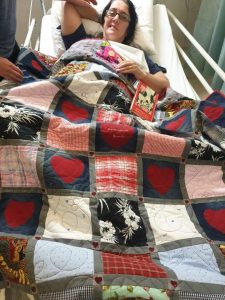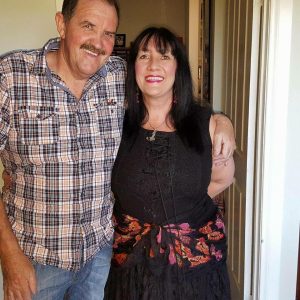The Impact of grief on health is a cautionary story for those who have lost someone to COVID-19. Editor
Take care of the one he/she loved: A Widow’s cautionary tale of the impact of grief on health: AKA: Strokes suck.
By Louise McOrmond-Plummer
In March 2019, my son was concerned that the left side of my face had drooped, and drove me to hospital, where CT scans revealed that I’d had an ischemic stroke. My dear reader, this stroke was an outgrowth of grief. You see, the death of my beloved husband Ken in 2016 was so catastrophic to me that I honestly stopped caring what happened to me, and as a result of that my self care went to Hell. I had always been somewhat Iatrophobic, terrified of doctors and their battery of  blood-tests, scans, specialists etc. AND Ken’s cancer death made this so much worse. I would not see a doctor even if I was actively sick. Was that rational? Probably not, but phobia rarely is. Widowhood was for me a plethora of unhealthy coping strategies like, too much booze and leaning all the harder on a 40 a day smoking habit.
blood-tests, scans, specialists etc. AND Ken’s cancer death made this so much worse. I would not see a doctor even if I was actively sick. Was that rational? Probably not, but phobia rarely is. Widowhood was for me a plethora of unhealthy coping strategies like, too much booze and leaning all the harder on a 40 a day smoking habit.
Should I have thought more about my family and thus taken better care of myself? Yes, I’m sure that I should have done so, but I guess That’s why I’ll never earn my wings, okay?
And, I don’t think it helps me to sit around beating myself up with “shoulda-woulda-coulda.” The consequences were to bite me on the ass in a big way.
I was so angry with myself for the impact of my shitty lifestyle choices on myself and my family, but, as a lovely nurse in the hospital said, “If you’re going to blame the cigarettes, you’ll also have to blame the stress of Ken’s illness and losing him.”
I’m sure some fellow widowed people will sadly relate to the culture of constant terror from the time we knew our partners were sick, through all the tests, scans awaiting the results, hearing the word “cancer” wondering if it had spread, and finally seeing the look on the faces of doctors just before they told you it was terminal. Yes, I was completely traumatized by it all, and I know it had a physical impact like driving up my blood pressure (the main culprit in my stroke). I was already vulnerable due to a lifetime of living with the PTSD engendered by an extremely abusive childhood, the domestic violence with a man who nearly killed me and from whom I extricated myself when I met Ken, who was my first experience of safety and real love in the world, and then he was torn away from me.
Even so, I saw a terrific counselor, and began to make headway through the grief. My counselor praised my resilience. Okay at this point I’ll just say I’m sorry that I have no narrative of resilience and triumph over adversity to share. It is what it is with all my weaknesses and foibles.
 And, the stroke made it so much harder. It gave me a massive shove backwards in terms of my grief, which felt worse again. Oh, come on, Louise, I said to myself, what could possibly be worse than those early weeks and months of bereavement? This. This was worse It was like losing Ken at a Different level. Here I was in hospital having a terrifying experience, and my soulmate and best friend, on whose support I would have counted, was dead.
And, the stroke made it so much harder. It gave me a massive shove backwards in terms of my grief, which felt worse again. Oh, come on, Louise, I said to myself, what could possibly be worse than those early weeks and months of bereavement? This. This was worse It was like losing Ken at a Different level. Here I was in hospital having a terrifying experience, and my soulmate and best friend, on whose support I would have counted, was dead.
Evidently, I had had the stroke a fortnight before presenting at the hospital. Most people know that with stroke, fast treatment is essential. Because such a long time had elapsed between stroke and treatment, I have been left with some disabilities. I am fortunate to be alive; I can still walk, talk, and see, many poor souls cannot .I have a weak left side I will probably never drive my car again. I must relearn certain things like making my bed, and typing. I cannot carry a grandchild because my stroke-related balance issues make this unsafe. I experience incredible fatigue after very little exertion I have experienced some grief for the things I can no longer do. I had months of rehabilitation, and I continue to kick goals. Probably the worst impact of the stroke has been a truly horrible level of depression, which has made me seriously consider suicide, which for me is absolutely out of the question, because I love my kids too much and they’ve already been through enough with losing their dad. For me, depression and grief seem to interact with each other, one makes the other worse. Medication and talk therapy seem to be shifting it. Another impact is “emotional incontinence, which is exactly what it suggests, I have become the world’s biggest crybaby. I burst into tearful meltdowns very quickly. Pardon my French, but stroke survival is a total clusterfuck, believe you me. But I am still here! And I will do my Ken proud by continuing to kick ass. If there is one silver lining, it is that I no longer fear Doctors. not one bit. After being surrounded by them on a daily basis, and having been scanned and tested for everything, and of course it is now necessary to have regular appointments with my GP to keep my blood pressure under control. It has been like intense but highly efficient exposure therapy, but at what a cost. I wish I’d gone to the doctor right after Ken died.
Why am I sharing this story? Well, I’ve rattled on long enough, and will end by saying to fellow widowed people, indeed anybody who has experienced a major bereavement, which may have been sudden or have come after a terrifying period of illness; whatever is the case, due to the extreme stress you’ve faced, your health may be compromised. I urge you to go to the doctor and be checked over. If you are scared, like I was, have a supportive friend or family member go with you. Ask for recommendations for GPs in your area who are compassionate and who will speak to you like a human being.
Finally, I am not going to segue into platitudes about what our deceased loved ones would or would not want, And yet, there’s a kernel of truth in it. They loved us so much. My spiritual belief system, which has been essential to my survival, holds that my Ken still exists in some form somewhere, and loves me still. Whatever, my point is that something that we can still do for our deceased people, to honour their love for us, is to care for ourselves; , And lets practice self care for ourselves too. We are worth it. Bereavement is hard enough without illness adding a whole new layer to the poop cake. In that spirit, suffice it to say that I Haven’t smoked—not one puff, since the stroke.
Take care, Precious souls
Every Wednesday we will be publishing Pandemic Weekly for, we hope, not too long. We invite you to submit your thoughts, essays, poems or songs. Please send to info@aftertalk.com.
We encourage readers to visit AfterTalk’s Ask Dr. Neimeyer column by CLICKING HERE

I recently told a friend who is coming up on the 1st anniversary of her husband’s death to really take care of herself. My first husband passed away 9 years ago. As the 1st anniversary approached, I became physically sick. Thank you for this post, I’m sharing the link to it in a Wednesday blog post.